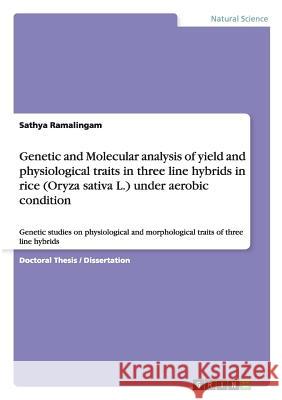Genetic and Molecular analysis of yield and physiological traits in three line hybrids in rice (Oryza sativa L.) under aerobic condition: Genetic stud » książka
Genetic and Molecular analysis of yield and physiological traits in three line hybrids in rice (Oryza sativa L.) under aerobic condition: Genetic stud
ISBN-13: 9783656325956 / Angielski / Miękka / 2012 / 336 str.
Genetic and Molecular analysis of yield and physiological traits in three line hybrids in rice (Oryza sativa L.) under aerobic condition: Genetic stud
ISBN-13: 9783656325956 / Angielski / Miękka / 2012 / 336 str.
(netto: 603,49 VAT: 5%)
Najniższa cena z 30 dni: 628,45
ok. 16-18 dni roboczych.
Darmowa dostawa!
Doctoral Thesis / Dissertation from the year 2012 in the subject Biology - Genetics / Gene Technology, Tamil Nadu Agricultural University (Madurai Agricultural College and Research Institute), course: Ph.D, language: English, abstract: An investigation in rice (Oryza sativa L.) was carried out subjecting six 'lines' and 15 'testers' crossed in a Line x Tester mating design to estimate gene action, combining ability and heterosis for yield and drought tolerant traits under aerobic condition. The 21 parents were also surveyed using SSR markers. From the Line x Tester analysis, the hybrids exhibited significant variation among themselves for all the characters studied under aerobic condition. The study of gene action for drought tolerance and yield component traits revealed that all the traits exhibited dominant gene action which was predominant. Therefore, to harness the dominant gene effects, either heterosis breeding or selection at later generations would be an appropriate breeding methodology. Based on the per se performance of lines and testers, the following parents i.e., IR79128A (L1), IR79156A (L2), COMS14A (L5), COMS24A (L6), IR 80286-22-3-6-1R (T3) and IR7925A-428-2-1-1R (T4) were adjudged as the best parents and crosses involving them would be expected to throw desirable segregants for both yield and drought tolerant traits under aerobic condition. Based on the gca effects, the parents IR79128A (L1), IR70369A (L4), IR79156A (L2), BI-33 (T15), IR79582-21-2-2-1R (T5), KMP-105 (T11), T1 (IR 69726-29-1-2-2R) and MAS - 946-1 (T9) were the best general combiners and the crosses involving them would result in the identification of superior segregants with favourable genes for both drought and yield. Out of 21 parents evaluated based on per se and gca effects, three 'lines' viz., IR79128A (L1), IR79156A (L2) and IR70369A (L4) and three 'testers' viz., IR7925A-428-2-1-1R (T11), KMP -148 (T12) and BI-33 (T15) were identified as the best genotypes which will be uti











